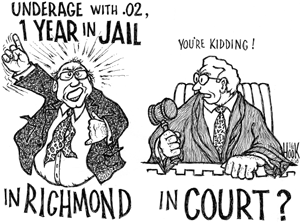NEWS- Zero tolerance: Baby DUIs put one-year jail option on tap

The press release from the Department of Motor Vehicles seems clear and was quickly picked up by the media: Effective July 1, underage drinkers who drive and have a blood alcohol concentration of .o2 will go to jail for a year and face a minimum fine of $500 or 50 hours community service.
Doesn't that mean that a 20-year-old who's had one drink could serve more time than someone with a BAC of .08 convicted of driving under the influence?
No, says the bill's sponsor, Delegate Bill Janis (R-Glen Allen), who distances himself from the fear-inducing press release. Janis says the point of making low-level underage drinking and driving– called a "baby DUI" by defense attorneys– a Class 1 misdemeanor, which is punishable by up to 12 months in jail and up to a $2,500 fine, is to bring the penalty in line with simple possession of alcohol by a minor, which also is a Class 1 misdemeanor. That doesn't mean every teen caught under the sip-averse law will spend time behind bars.
Jail time is an option for a judge, especially if the young imbiber kills or harms someone, but the meat of the new law is to raise the mandatory license suspension from six months to 12 months, plus throw in either a $500 fine or 50 hours of community service.
"We didn't catch the disparity of the law," explains Janis, until police busted underage parties in Henrico County and judges there alerted him to a problem.
"The kid arrested holding a beer could lose his license for a year," says Janis. "The kid who drove away and had alcohol only loses his license for six months."
The amended law falls into the Commonwealth's zero-tolerance policy towards teens and booze. "I think zero-tolerance policies work when kids are sent an unequivocal message," says Janis. When minors lose their license for a year, "They go from being cool to getting back to going to school by riding the Big Cheese," says the lawmaker, using his children's term for the school bus.
Others are more skeptical about the effectiveness of zero-tolerance, or for the need of increasing the penalty. Several local defense attorneys say they don't see that many baby DUIs.
"If anything, you see more underage DUIs," says David Heilberg, "because in that [baby DUI] range, they may not be impaired enough to be caught unless there's an accident or they're speeding. I see more DUIs than that charge."
He also notes that the under-21ers charged with possession can opt for pre-conviction probation, go to alcohol school, pay a fine and have the charge dismissed a year later if there are no subsequent charges. Not so for the baby DUIers.
"A kid with a driving charge is going to have a record," he says.
"It's interesting that the motivation is comparative punishment, not whether it's needed," muses Heilberg.
"It's accurate to say the penalty could be a sentence to one year in jail, but that would be rare," says sponsor Janis. That's no comfort to attorney André Hakes.
"Why make it a Class 1 misdemeanor?" asks Hakes. "Why put it in there if they didn't intend jail time?"
"If I beat you to a pulp, for assault and battery, I'm looking at a 30-day suspended sentence," says another local defense attorney, who agreed to speak only on the condition of not being identified. "There's something wrong with our system that punishes a driver more than an assailant."
This attorney believes the pendulum has swung too far on underage drinking, starting with federal pressure led by President Ronald Reagan and a group called Mothers Against Drunk Driving back in the 1980s that states raise their drinking ages from 18 to 21 or lose federal transportation funding.
And high-profile teen deaths locally the past few years– Albemarle High's Nolan Jenkins, 17, in 2006, and Brittany Hope Bishop, 16, in 2002, and Charlottesville High grads Aaron Zentgraf, 20, and Ross Pickering, 19, in 2003– are tragedies that shake the community to its core and prompt further efforts to legislate already illegal teen drinking.
Numbers from the Department of Motor Vehicles [see sidebar] show that the alcohol-related crash rates soar in the 21 to 25 age brackets.
But as for the effectiveness of zero tolerance and a one-year license suspension's ability to change behavior, attorney Hakes doesn't believe it'll work any better than the current six-month suspension.
"Most kids who care about losing their license for a year would care about losing it for six months," observes Hakes. "When you look at the states as a group, Virginia seems to be pretty heavy on the punitive end of the spectrum."
#
